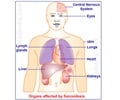Highlights
- Chronic obstructive pulmonary disease is the term used to describe a number of progressive lung diseases which mainly occurs in smokers.
- Severity of COPD leads to ////approximately 150,000 hospital admissions and 1.2 million bed-days every year.
- A new triple inhaler tested in patients with COPD showed a reduction in flare ups by 20%.
A trial involving 2,691 patients tested the efficacy of the inhaler. The subjects were randomized to 3 groups. Thousand subjects were given a new inhaler to manage their condition, which contains three different compounds, while another thousand were given the most common globally used inhaler. A further 500 were given the triple combination but in two inhalers.
This group as a whole would expect to experience average 1.3 exacerbations or severity of the disease per person in a year - which are usually caused by an infection and can result in hospitalisation or death and faster progression of the disease. However the risk of an exacerbation was reduced by 20% in the group using the triple inhaler.
Professor of Respiratory Medicine at The University of Manchester, Jorgen Vestbo, said: "This is the first long-term study to look at the possibilities of triple therapy as a preventative measure for COPD exacerbations.
"COPD exacerbations lead to approximately 150,000 hospital admissions and 1.2 million bed-days every year in the UK, so to reduce this figure by 20% would make a huge difference, not only for patients' quality of life, but also for the resources of the NHS."
Using a count of blood eosinophil (a type of immune cell), it was possible to identify patients more likely to have even greater benefit from the triple inhaler containing an inhaled steroid.
- COPD can increase your chances of developing lung infection. The infection may even assume serious proportions due to reduced immunity in the elderly. Therefore, it is a good idea for older patients with COPD to get a flu shot to prevent pneumonia.
- Patients with COPD may also suffer from other comorbidities like heart failure and lung cancer. Therefore, it is necessary to monitor for these conditions in patients with COPD.
- COPD cannot be completely cured, but the symptom management is possible with medications. The patient can be made to feel comfortable and the progression of the disease can be slowed down.
- Patients with very severe COPD may require ventilatory support. The oxygen content of the blood can be measured by a simple non-invasive method called pulse oximetry.
- Jorgen Vestbo et al., Single inhaler extra fine triple therapy versus long-acting muscarinic antagonist therapy for chronic obstructive pulmonary disease (TRINITY): a double-blind, parallel group, randomised controlled trial, Lancet (2017).
Source-Medindia















